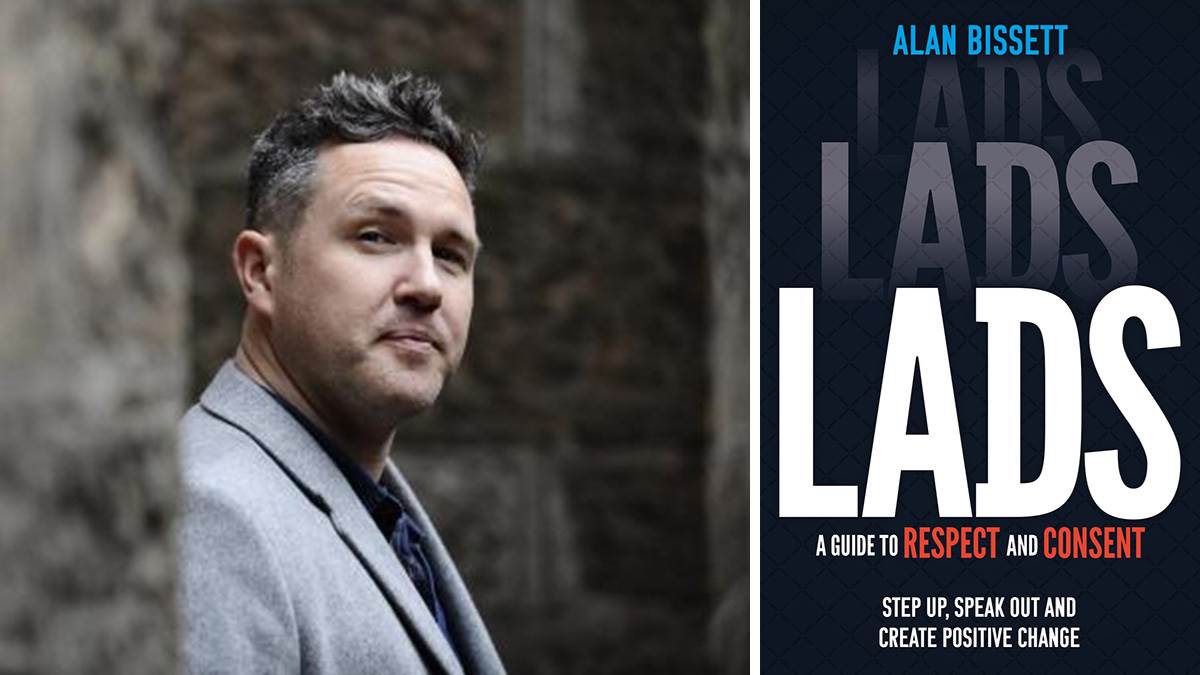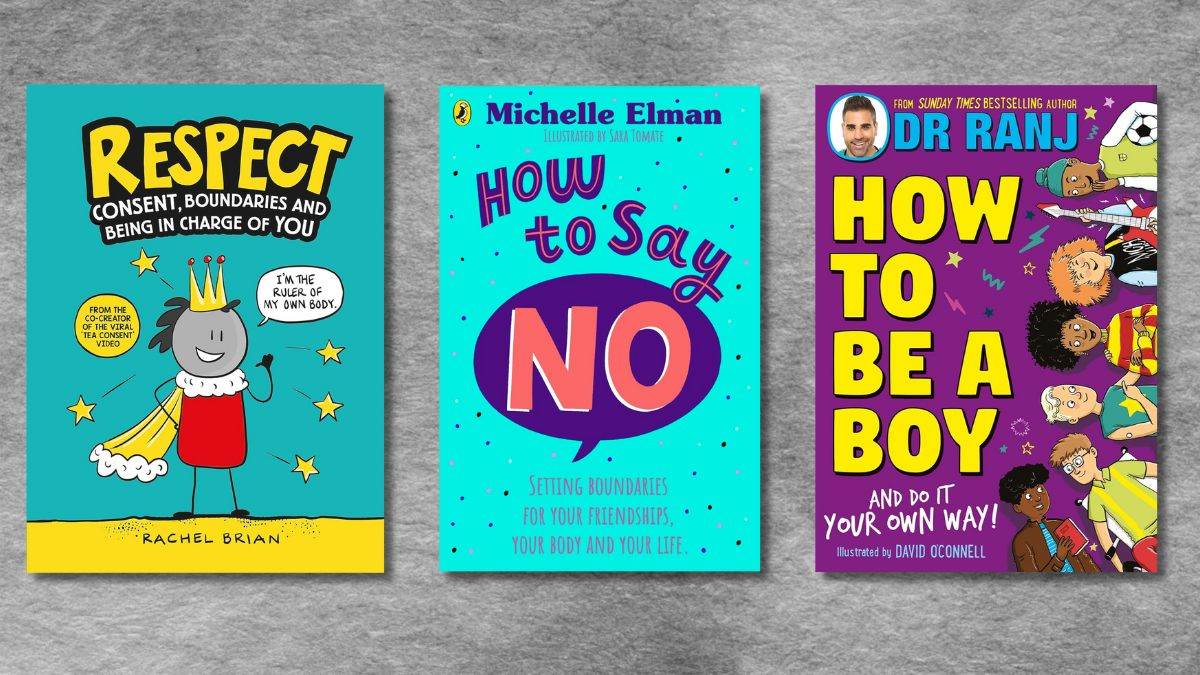How to use books to talk to teens about boundaries and consent
Published on: 12 December 2023
We at BookTrust know that non-fiction can be really useful for helping teenagers find a path through their worries. We asked Lads author Alan Bissett to explain how books can offer support and guidance...

We've all been there. That one pal – sometimes more than one – acting up, pushing the boundaries, daring others to push theirs, being annoying, cocky, mocking. He's performing for real-life Likes, trying to elevate himself by being the loudest, the most shocking, the most outrageous, hoping to win bigger and bigger laughs from the group or be the one that the Greatest Stories of All Time get attached to: 'OMG, you should've seen Jack at the weekend, he went up to this girl and just said, right to her face, EXPLETIVE EXPLETIVE EXPLETIVE!'
Except he didn't say 'EXPLETIVE'.
But, hey, that's 'just Jack'.
As we know – remembering our own teenage years – Jack drags everyone down with him. The whole group becomes Jack, since they are the ones seen with him, after all. Approval is implied by the fact of the friendship itself. As my dad used to say: "If ye flee wi the craws, ye get shot wi the craws" (it's best said in a Scottish accent for maximum effect).
But challenging the behaviour of our friends is difficult. It brings conflict.
How books explore social pressure
As a reader, my bookshelves are filled with novels which explore the perils of group-think: Donna Tartt's The Secret History, in which the naïve Richard Papen is drawn into a murder through his longing to be accepted by a glamorous clique; Todd Strasser's The Wave, in which a class of students willingly surrender to and enact fascism in their high school; James Hogg's The Confessions of a Justified Sinner, in which fanatical religious devotion literally turns its protagonist into a serial killer.
It's hard to rebel against social pressure. There are always consequences. Our peers make demands of us: they expect us to look, act, and talk in certain ways, and if we speak out against them we can be often ostracised or punished. It's often simply easier to ignore or condone dangerous or bullying actions.
And children's literature especially is replete with examples – often allegorical ones – of what happens when we fail to question the motives or behaviours of our peer group: by following Chicken Licken, after he asserts that the sky is falling in, Turkey Lurkey, Goosey Loosey, Henny Penny, Drakey Lakey and Ducky Lucky are led to their deaths.
The beasts of George Orwell's Animal Farm end up in ruin by blindingly accepting that their fellow creatures, the pigs, have their best interests at heart.
This is often how 'Jack' gets away with his behaviour: people are unwilling or too intimidated to challenge him.
Books about consent and boundaries to try

In the field of children's non-fiction there are now many guide books out there to help parents introduce the themes of consent and boundaries to their sons and daughters.
Respect by Rachel Brian is full of wonderfully entertaining graphics which explain to young people that their body is theirs and that they should do nothing with it they're not comfortable with. It also teaches them that the same goes for other people's bodies, and does so with some very imaginative examples.
I particularly like 'The Badger Story', about changing your mind after failing to enjoy an experience you thought you might like, such as bringing a badger into your home that you thought was going to be a cute companion.
Except it's not really about a badger.
For a more developed thesis – and more developed reader – there's How To Say No by social media influencer Michelle Elman, a mainly text-based experience which goes into greater depth on the same themes, but still includes fun illustrations. It also has possibly the greatest sub-heading of any book ever: 'Fart in Your Own Room, Not in Mine'.
But for the more persistent 'Jack', or unfortunate 'friend of Jack', there are books which speak directly to boys, such as How to Be a Boy (And Do It Your Own Way) by Dr Ranj Singh. There are many demands on boys to 'perform' certain aspects of masculinity – for the benefit of other boys – which can come at cost to their mental health, and Singh's book is excellent on how young men can deal with that kind of pressure. It also reassures boys that masculinity per se isn't bad or harmful - only particularly toxic forms of it.
Writing a toolkit for teenage boys
This is also one of the reasons why I wrote Lads: A Guide to Consent and Respect, a toolkit for teenage boys to recognise actions and attitudes which threaten women and girls – whether their own or those of friends – and take positive, proactive steps to deal with them.
This might take the form of what you say to 'Jack' when he's careering about the dancefloor, behaving inappropriately towards girls, or spitting out misogynistic invective. I've tried to put myself (back) in the mind of a teenage boy who knows something isn't quite right about such behaviour but feels limited in the ways he can deal with it.
I've tried to take him through what he can do, step by step, to confront both his toxic friend and possibly aspects of his own insecurities which might get in the way of healthy relationships with girls.
We're all aware of the extent to which overbearingly masculine influencers have a grip on the minds of many young men. Being the teenage boy who stands up against that might very much feel like being the protagonist of a dystopian novel, who knows that saying something, effecting change, is more important than silent complicity. But that's who we want to inspire them to be.
We discover our best selves through literature, reading between the lines to better ourselves as individuals. As youths, it isn't as easy to pull out the learnings, but the more young men read, the more they'll understand the hero's journey and hopefully strive to be their best self.
Lads: A Guide to Consent and Respect by Alan Bissett is out now.
Topics: Friendship, Personal/social issues, Features





